Contemporary Protestantism
That means “within my lifetime”. I know, to some of you this will seem like ancient history!
There is so much to say about Protestantism. Can you all hang in here for an extra week? … … I just heard a unanimous cry, “Yes!” So now it’s 3 weeks on modern Protestantism. Then 1 more on “extra-Protestant” groups – Christian Science, Mormons, Unitarians and Jehovah’s Witnesses – and that will be interesting, guaranteed.
In this article, in no way do I intend to malign Protestants. God bless our Protestant brothers and sisters. I quoted one of my professors early in this series: “Many people are better than their theology”. But, as we shall discover as we go along, most people these days don’t pay much attention to theology. And the fact is people don’t care much about facts, and the truth is people are not much interested in truth. Has it always been this way? Or is this just a product of our modern, uh…. “rational” age?
Anyway, we all have known and read of many good Protestants, some of whom would likely be on our calendar if they had been Orthodox. As I replied to someone’s comment last week, “Protestantism led me to Jesus Christ and then gave me a social conscience. The Anglo-Catholic side of the Episcopal Church (before it fell apart) taught me the Faith. I thank God for it all.” And then Protestantism pointed me towards Orthodoxy. If it weren’t for Protestantism I wouldn’t be here. Thank God 40 times
many good Protestants, some of whom would likely be on our calendar if they had been Orthodox. As I replied to someone’s comment last week, “Protestantism led me to Jesus Christ and then gave me a social conscience. The Anglo-Catholic side of the Episcopal Church (before it fell apart) taught me the Faith. I thank God for it all.” And then Protestantism pointed me towards Orthodoxy. If it weren’t for Protestantism I wouldn’t be here. Thank God 40 times
The Decline of the Mainline
We looked in Part 1 at how the negative side of Biblical criticism slowly took hold in Protestant seminaries and schools, beginning in the late 19th century. Scholars, clergy, teachers began to lose faith in the authenticity of the Bible, and for Protestants who believed in “Sola Scriptura” this was serious. This doubt moved out slowly into “mainline Protestant” parishes – Congregationalists, Methodists, Presbyterians, and then a bit later it hit most Anglicans and some Lutherans, because they (Lutherans denying it all the way!) had retained some of the Church’s Tradition. The result was dwindling congregations. Seeing what was happening, most Baptists and other Lutherans fought Biblical criticism tooth and nail, becoming essentially Fundamentalists in the process.
Here was my own experience. In the early 1960s I attended a Methodist seminary in Evanston, Illinois, that was then beginning the transition from conservative to liberal. A liberal New Testament professor started by telling us that he was going to tear the New Testament apart, so he could put it back together again. Even then I thought “uh oh”. He did the first part very well, left us doubting everything. Somehow he never got around to the second part. My shallow faith was shaken. Then it occurred to me that if Matthew, Mark, Luke and John hadn’t got it right in the first century, chances were slim that Dr. Lundgren in Evanston, Illinois, 20 centuries later and in an entirely different culture, was going to figure it out. But that left me with…? If there wasn’t something more solid to hang my faith on, I would have to give it up.
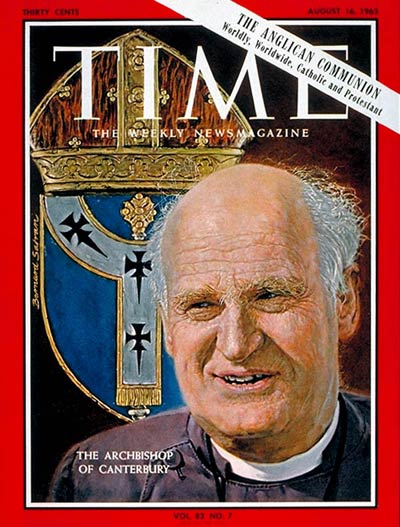
There was. I pray every night for 2 men of the time: an old-fashioned British Methodist professor at the seminary who taught us the Creed, and Archbishop of Canterbury Arthur Michael Ramsey who arrived in Evanston for a lecture series, just when I was desperate, and taught the Faith of the Church, the Orthodox Faith. I later discovered that his ecclesiology was almost but not quite Orthodox, but open his book The Glory of God and the Transfiguration of Christ, and you’d think you were reading one of the Fathers.
And that begins another story of which you know the happy ending, and maybe I’ll tell you the middle part sometime.
However, most of my classmates were not so blessed. They went out to teach and preach whatever was in fashion at the moment, or whatever they could figure out on their own until they changed their minds and taught something else. Lord, have mercy.
Your average Protestant parishioner was either confused or offended by this, and it led, not surprisingly, to a loss of personal faith, a decline in theological and moral standards, and a major loss of members. Why go to church to hear God only knows what this Sunday? A Methodist preacher’s wife (known to me in 1962) taught this to her Sunday School class on Easter: “Jesus died because he loved us, but it’s ok. We still have his teachings.” Period. That was it. You can see why believers had a problem with this sort of thing.
So here is what has happened to the classical Protestants: In Britain today most Methodist and Presbyterian “chapels” are closed. Few go to church any more in England, Scandinavia, France or Germany. In England 2% of the people are in church on the average Sunday.
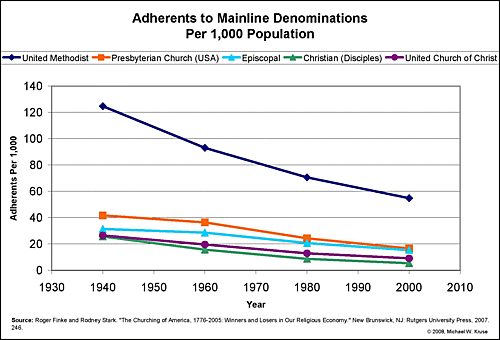
In America the Episcopal Church is typical: in 1965 it had 3.6 million members; today it has barely 2 million. The liberal Evangelical Lutheran Church in America had 5.1 million members in 2000, only 3.5 million in 2017. Even the conservative Missouri Synod has dropped from 2.8 million members in 1970 to 2 million today. Demographics also are a problem. The birth rate is low among the “mainline”, and many young people are not hanging in.
Among the religious population of the United States today, only about 5% are now “mainline Protestants”. There are pockets of life, but many parishes live on money accumulated from the old days. Their future looks bleak. In fact a 2017 Washington Post article says at the present rate of decline “Mainline Protestantism” has about 23 years left in the United States. See https://www.washingtonpost.com/news/acts-of-faith/wp/2017/04/28/if-it-doesnt-stem-its-decline-mainline-protestantism-has-just-23-easters-left/?utm_term=.1f9e48872f16
For those of us who were there and lived through it, it is sad. Very sad. Many peoples’ spiritual lives were badly hurt. I look back at Anglicanism and what it was, what was lost, what it could have become, with great sorrow – even now 30 years later.
But however you explain it, most Americans – as opposed to Europeans – did not turn away from Christianity. Here about 40% of us still attend church weekly. Americans just switched brands, so to speak. If Chrysler isn’t getting us there anymore, we’ll change to Chevrolet.
The Rise of the Evangelicals
Evangelicals have grown like crazy. I’ve watched it, and you probably have too. An independent “Bible church” opens, and 2 weeks later they’re putting on an addition and a big parking lot. (OK, I exaggerate, but not by much.)
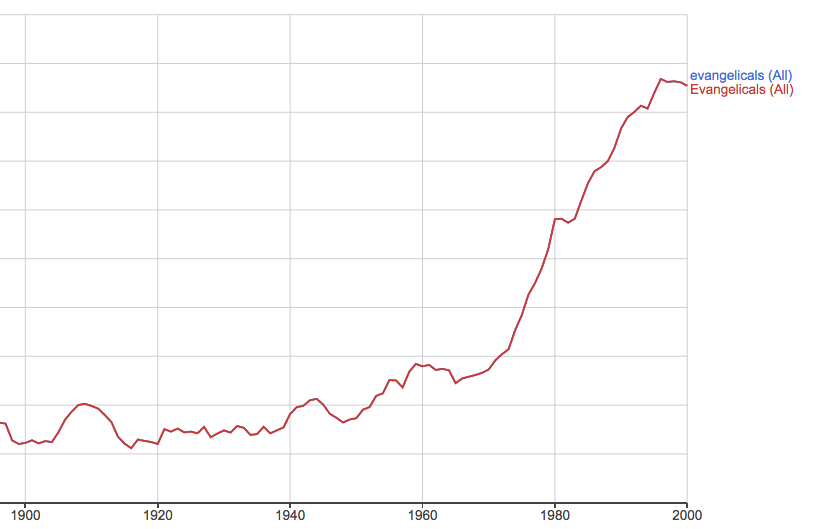 You see that their serious growth began just at the time the “mainline” was declining. Evangelicals now comprise about 25% of the American religious population, though we should note their growth has been leveling off and is no longer keeping up with American population growth. However, worldwide amazing growth continues. From 1960 to 2000 the number of Evangelical Protestants grew at 3 times the world’s population rate, and twice that of Islam! It is because of the Evangelicals that Christianity is the world’s fastest growing religion. (This is from Wikipedia which I hate to quote, but it does give such easy access to a vast number of sources: https://en.wikipedia.org/wiki/Christian_population_growth#Protestantism)
You see that their serious growth began just at the time the “mainline” was declining. Evangelicals now comprise about 25% of the American religious population, though we should note their growth has been leveling off and is no longer keeping up with American population growth. However, worldwide amazing growth continues. From 1960 to 2000 the number of Evangelical Protestants grew at 3 times the world’s population rate, and twice that of Islam! It is because of the Evangelicals that Christianity is the world’s fastest growing religion. (This is from Wikipedia which I hate to quote, but it does give such easy access to a vast number of sources: https://en.wikipedia.org/wiki/Christian_population_growth#Protestantism)
How to define Evangelicals
Before we go farther, who are these “Evangelicals” of whom we speak? (Oh no, here we go again with more confusion. But this is Protestantism, brothers and sisters.) Don’t confuse these Evangelicals with classical conservative Lutheran, Calvinist and Anglican Evangelicals. Don’t confuse them with the Evangelical Lutheran Church of America which is now liberal. We are talking here about the newer phenomenon of American Evangelicals.
My cutesy way of describing them has been to say that today’s American Evangelicals are “Fundamentalists on steroids”! But, sorry, this also may be wrong. The National Association of Evangelicals says that, while they agree with Fundamentalists about many things, especially their commitment to the Scriptures alone as the key to faith, they are less politically and socially conservative than Fundamentalists. Hmmm… But the consistent right wing politics of Evangelicals is now all over the news. I don’t understand.
So I think I’ll use the popular parlance here. Like the media, let’s lump all conservative Protestants together – Fundamentalists, Bible Churches, whoever – as “Evangelicals”.
What are Evangelicals like?
From the beginning Evangelicals have been divided in many ways. Some seek miracles, others believe there have been no miracles since New Testament times. Some say to be saved one must have a “born-again” emotional experience. Others say that’s not so, but you can guarantee salvation by saying you believe in Jesus Christ as your Lord and Savior, and that alone does it. Still others are closer to classical Protestantism. And so on and on.
However, they share some common characteristics. All believe in Bible alone. All Evangelicals long ago abandoned liturgy and sacraments (as we know them) and even dignified worship. When I was a boy in the Methodist church, which was then still conservative Evangelical, worship services were quiet and “proper” with many 18th and 19th century hymns, including some good “orthodox” Wesleyan ones. In those days some congregations used fixed liturgical forms, others mostly extemporaneous prayer.
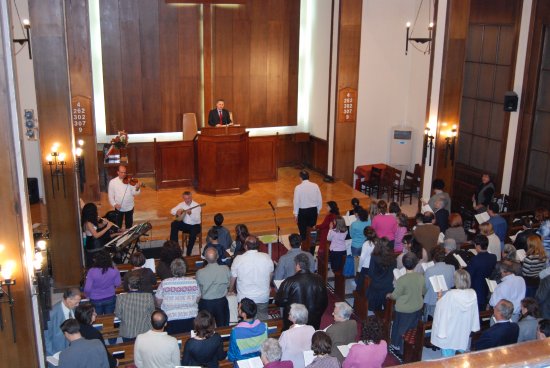 Today’s Evangelical worship is entirely free form, though I hear that a few are trying to recover more liturgical worship. Some congregations may stress education with much preaching.To the left, dear ones, is the First Evangelical Church of Athens, Greece. I’ve heard some excellent sermons from Evangelical preachers. But the rich preachers on TV also qualify as Evangelicals. (A friend of mine described their preaching: “Alleluia! Give your heart to Jesus! Give your money to me!”) However, much Evangelical worship today seems to be entertainment designed to give people an
Today’s Evangelical worship is entirely free form, though I hear that a few are trying to recover more liturgical worship. Some congregations may stress education with much preaching.To the left, dear ones, is the First Evangelical Church of Athens, Greece. I’ve heard some excellent sermons from Evangelical preachers. But the rich preachers on TV also qualify as Evangelicals. (A friend of mine described their preaching: “Alleluia! Give your heart to Jesus! Give your money to me!”) However, much Evangelical worship today seems to be entertainment designed to give people an

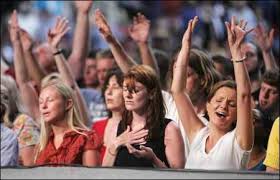 emotional experience. The music has guitars and the like, with catchy pop songs, often telling about how “I” feel about God, rather than the worship of God. On 1 pop chart the Top 2 Evangelical hits this week are “Restless Love” by Corey Asbury and “I Just Need U” by TobyMac (1 word). Check him out for yourself – then please come back.
emotional experience. The music has guitars and the like, with catchy pop songs, often telling about how “I” feel about God, rather than the worship of God. On 1 pop chart the Top 2 Evangelical hits this week are “Restless Love” by Corey Asbury and “I Just Need U” by TobyMac (1 word). Check him out for yourself – then please come back.
This is a long way from “Holy God, Holy Might, Holy Immortal”. I’ve been trying to imagine the Top 2 Orthodox Hymns of the Week. You can see that the Evangelical movement is a whole different animal.
A member of the Lutheran church up the hill from us recently complained to me that they have now gone to screens up in the front of the church with the words for hymns or prayers of the service projected onto them. Conservative Missouri Synod Lutherans!! This is part of what a Lutheran pastor friend (now Orthodox) described as the “Baptistification of American Protestant worship”. Actually I think it has now gone farther than the Baptists.
Are the Evangelicals Creedal? I know of none that recite the Creed, because it’s not directly “Biblical” – but neither are the songs they sing. (I don’t understand this.) However I once read the Nicene Creed to a member of an Evangelical congregation, and he said “Yes, I believe all that.” Holy Communion is occasional, and again without fixed forms. It’s hard to know what they believe about it. I have heard of Evangelicals who simply place some bread and grape juice at the front of the church, and people come up and take some as they wish.
I know Orthodox who have attended an Evangelical service and come home shaking their heads, it seems so foreign to them and (I’m sorry) so shallow. So much is missing. I once went to a wedding service at one of the “Brook” churches. I can’t remember how the preacher worked the topic of the glory of Old Testament holiness into his excellent wedding sermon, but he did. Then the wedding service continued with the bride standing up front singing a pop love song to the groom, and things proceeded in a similar vein after that (twang, twang, twang went the guitars), and I wanted to cry out “Ichabod!”, “The glory has departed!” (I didn’t.)
But have the people departed? No way. 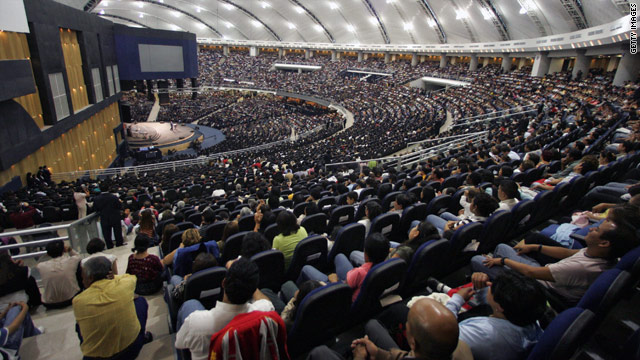
Next Week: Why have the Evangelicals grown? and Pentecostals and Charismatics and more.
Week after next: Some “Extra-Protestant” groups
In my town, you can pull a driver out of the golf bag and put a ball through the window of a Baptist or Evangelical church in practically any direction you hit it. Not long ago, we got a LifeChurch. It’s an interesting concept in that a pastor at HQ gives a sermon that’s simulcast–and rerun–in every…franchise? I wonder if St. Chrysostom would have salivated at the thought of having his sermons simulcast from Georgia to Gaul. That kind of setup would have broken a fundamental “security feature” of the Church, though. Centralized teaching is more of a post-1054 thing. My wife and I went a couple years ago to see what it was about. Really loud band, which I didn’t mind because I like electric guitars, but in the end, the sermon totally took the sentence on which it was based out of its context in the psalm. Disappointing. We were looking for something meaty and got mostly crispy, fried breading with a chicken nugget buried inside. I went to an Orthodox church last summer and was like, “Whoa, this ain’t Southern Baptist.” Meaty? Orthodoxy is like one of those Brazilian steakhouses where they’ll just keep shoveling meat onto your plate as long as you have the green side of your card turned up. You have to consciously stop absorbing information and just digest what you’ve taken in for a while.
Fr. Bill,
I’ve been working through this a long time, thinking about how best to introduce Evangelicals and Reformed (my background) to Orthodoxy and I think a topic that doesn’t get covered is Original Sin. All of the Evangelical churches owe their existence to the Reformed and modifications of their soteriology. They are Reformed-lite. They don’t know this, they think they are just being “Biblical” – but if they knew they really owed their soteriology to the Reformer’s and Augustine – and reimagined Christianity without Original Sin (though they may not use that term) – Orthodoxy would begin to click.
So, in short, I really think it would be worthwile, extremely worthwhile, if when we point out the failures of Protestantism and how we ended up with modern Evangelicalism – that really it’s a soteriological mistake – not just a mistake of Sola Scriptura (Sola Scriptura itself is a soteriological mistake). The rationale of Orthodoxy pulls everything like gravity once the mass of Original Sin is removed.
I’ve spend significant time on this and as of yet have found little popular Orthodox engagement on this foundational soteriological error.
God bless you!
I don’t really understand how Evangelicals deal with original sin. If we actually went “back to the Bible”, we’d all see that sin in the New Testament means simply “missing the mark”. The point of the Gospel is not to give us legal forgiveness for going off the tracks, but to get back on the tracks again.
I think if Evangelicals understood that their soteriology is a re-hash of TULIP, that the presupposition behind all of their soteriology (which is what they are most passionate about) is false, they would take seriously the claims of the Orthodox Church.
I appreciate all of the blogs that give attention to the history and fallout of the Reformer’s mistakes, I do. But someone needs to go at the root, the presuppostional level. If Original Sin (and the Reformed take on it) is undergirding the entirety of a theological enterprise, then dismantling this false belief will make Orthodoxy, if it is presented, a welcomed breath of fresh air.
I just happen to see all of the theological confusion, splintering, amassing of denominations, etc. – it’s all largely due to Original Sin and theological implications worked out by the Reformer’s.
Thanks, Matthew. Please explain to us exactly what TULIP is and what Evangelical soteriology is all about.
Americans love to be entertained.
Amen on that. The idea to sit/stand passively with many others seems to fit a sense of holiness and ritual for many. Toe tapping, hand swaying, and choreography of stage lighting seems to create an appeal to many of us, a generation weaned on television talent shows and youtube shorts. Myself, I find comfort in the traditional repeated prayers and format of worship. I better sense the awe of God. Traditional worship lessens the grip of the moment with my own distractions. I am reminded of my own personal worship history with it’s growth, stagnations, and reforms. I regain some comfort and focus for God . I am inspired to comprehend and take on my mission. Moreover, the homily/sermon often provides me with further direction, instruction and incentive to get back on track. The receiving and celebration of the Eucharistic meal kindles my soul. Often, I find I long for the Eucharist alone both my during daily prayer and then again, after the sermon at worship. When I have attended services at a non-denominational service, the aural vibrations tend to distract me from the message. I am amazed at how other worshippers can flip through to Bible passages and make notes along their Holy books. Lot’s of sensory and motion, but my spirit doesn’t seem to awaken to God’s path designed for me. Despite the appealing lighting and sound systems, I feel myself falling through the cracks at those services and not deriving the massive Holiness of the Trinity.
Everything you say about Protestantism is accurate, especially the Episcopal Church. I spent 30 years as an Episcopalian and wrote the book “The Episcopal Church’s History: 1945-1985” (Morehouse, 1987.) At the conclusion of the book, I was optimistic about the church’s future, but it all started going downhill not long after that, especially the 1991 General Convention, which refused to condemn sex outside of marriage for clergy. My wife and I became Orthodox Christians in 2004 and attend St. George in Fishers, Indiana, along with Matt Lyon and his lovely family. I used to write fairly often (two or three times a year) for The Living Church. David Sumner
Thank you, David. A couple of years before 1985 is when I gave up on Anglicanism, as much as I loved it. But “everything…is accurate”? I tried, but I seriously doubt that!